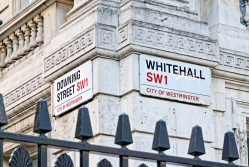 Matt Hancock, minister for the Cabinet Office, has unveiled a new target to get more small businesses working on central Government contracts.
Matt Hancock, minister for the Cabinet Office, has unveiled a new target to get more small businesses working on central Government contracts.
The aim is to ensure that £1 in every £3 that Government spends will be with small businesses by 2020.
In 2013-2014, central Government spent £11.4 billion with small and medium-sized businesses - those employing 250 employees or less. This is equivalent to 26% of central Government spend.
By 2020, the Government wants to increase this to a third. This would mean an extra £3 billion per year going to SMEs directly or through the supply chain.
Matt Hancock described the initiative as "an amazing opportunity for the country's diverse and innovative small businesses" and he urged them to "get stuck in".
He added: "From computers to uniforms - there are so many opportunities for small businesses to work with us, and I want to see more of them providing value for money for the taxpayer and benefiting from our spending."
Earlier this year, the Government announced improvements in the way it buys goods and services to help more small businesses bid for public sector contracts. These included:
- Requiring the entire public sector supply chain to be paid within 30 days;
- Abolishing pre-qualification questionnaires (PQQs) for low-value contracts;
- Ensuring all public sector contracts are published in one place (Contracts Finder).
Each government department and the Crown Commercial Service will now make sure that it meets this target by setting out individual plans and targets for spending with SMEs over the next five years.
John Allan, national chairman for the Federation of Small Businesses (FSB), said: "The Government has much to gain from opening up public procurement to smaller businesses and we welcome [its] commitment to achieve this ambitious target. To meet it, the Government will need to focus on robust monitoring and challenge of poor practices wherever they are found. The FSB will play its part, and will work with ministers on this important goal."
John Manzoni, chief executive of the Civil Service, said: "Further opening up our marketplace to small businesses is good economic sense all round - making it easier for them to access and win Government business opportunities, whilst encouraging increased competition and market innovation to deliver best value for the taxpayer."
